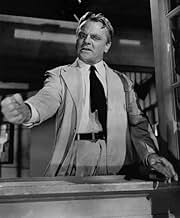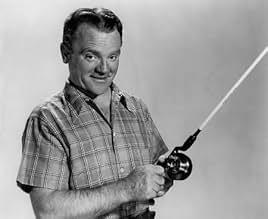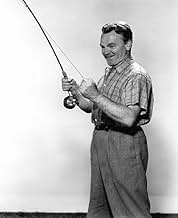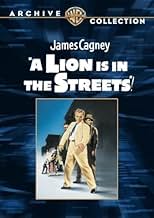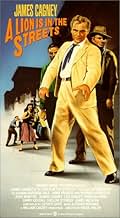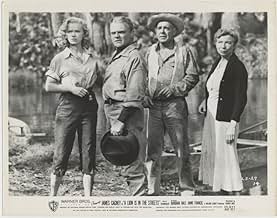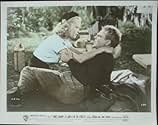CALIFICACIÓN DE IMDb
6.1/10
1.1 k
TU CALIFICACIÓN
Agrega una trama en tu idiomaA charismatic peddler from the bayous finds his true calling in politics. Is he a demagogue in the making?A charismatic peddler from the bayous finds his true calling in politics. Is he a demagogue in the making?A charismatic peddler from the bayous finds his true calling in politics. Is he a demagogue in the making?
- Dirección
- Guionistas
- Elenco
Lon Chaney Jr.
- Spurge McManamee
- (as Lon Chaney)
Lee Aaker
- Johnny Briscoe
- (sin créditos)
Victor Adamson
- Townsman
- (sin créditos)
Carl Andre
- Townsman
- (sin créditos)
Nadine Ashdown
- Minor Role
- (sin créditos)
- Dirección
- Guionistas
- Todo el elenco y el equipo
- Producción, taquilla y más en IMDbPro
Opiniones destacadas
A Lion Is In the Streets wastes enough talent for at least a half-dozen good movies. It had an excellent director, Raoul Walsh, but a bad script. James Cagney is energetic in the lead, as a Huey Long-like Southern pol, but his accent is poor, and he seems out of place running around the bayous in a white suit. The fine supporting cast,--Barbara Hale, Anne Francis, John McIntire, Warner Anderson--don't have much to work with, and the dialogue is mediocre throughout. Franz Waxman's dynamic, stirring score is wasted also, and deserves a better film. The movie looks anachronistic for its year of release (1953), and might have worked better had it been made in black and white, five or ten years earlier, while color just makes it seem artificial and unreal. I kept on expecting Lon Chaney, Jr. to turn into an alligator man every time he showed up.
It's unfortunate that A Lion Is In the Streets came out after All the King's Men. Both films were based in part on the legend of Huey Long. I think All the King's Men is better, but A Lion Is in the Streets has its moments.
For one thing it has the dynamic presence of James Cagney. You would hardly think that the very urban Mr. Cagney could pull off the role of a southern demagogue, but pull it off he does. It's the story of a man who is an itinerant peddler with a good gift of gab. You like him in those first few minutes of the film as the peddler takes shelter in Barbara Hale's one room schoolhouse. But as he discovers his gift for demagoguery he fascinates and repels the viewer as much as he enthralls the crowds in the film.
For another since our protagonist doesn't quite get to the heights that Broderick Crawford did in All the King's Men, it instead concentrates more on the man's humble beginnings. Instead of being a farmer who was educated by his wife as Broderick Crawford was in All the King's Men, the real Huey Long in fact was an itinerant peddler who was educated by his wife Rose McConnell Long. In fact Huey, Rose, and Russell are the answer to a trivia question as being the only parents and child who served in the United States Senate. Rose was given a temporary appointment to his seat following Long's assassination and son Russell had a considerable career in the Senate himself.
Barbara Hale's role is pretty modest, but that's how Rose McConnell was in real life. In their marriage she put up with quite a lot from Huey.
James Cagney produced this one himself with brother William Cagney taking on the administrative responsibilities and both of them giving little sister Jeanne Cagney her career role. She's the wife of luckless sharecropper John McIntire whose death Cagney demagogues for all its worth. The scene with the dying McIntire in court will chill you with fright. Jeanne is a true believer in Cagney the man and it's her disillusionment with him that leads to the shattering climax.
Other good performances in the cast are Anne Francis as bayou mantrap Flamingo, Larry Keating as the stuffed shirt that Cagney attacks for his own ends, and Lon Chaney, Jr. who is Francis's stern father.
It's not as good as All the King's Men, but A Lion is in the Streets has a lot to recommend it.
For one thing it has the dynamic presence of James Cagney. You would hardly think that the very urban Mr. Cagney could pull off the role of a southern demagogue, but pull it off he does. It's the story of a man who is an itinerant peddler with a good gift of gab. You like him in those first few minutes of the film as the peddler takes shelter in Barbara Hale's one room schoolhouse. But as he discovers his gift for demagoguery he fascinates and repels the viewer as much as he enthralls the crowds in the film.
For another since our protagonist doesn't quite get to the heights that Broderick Crawford did in All the King's Men, it instead concentrates more on the man's humble beginnings. Instead of being a farmer who was educated by his wife as Broderick Crawford was in All the King's Men, the real Huey Long in fact was an itinerant peddler who was educated by his wife Rose McConnell Long. In fact Huey, Rose, and Russell are the answer to a trivia question as being the only parents and child who served in the United States Senate. Rose was given a temporary appointment to his seat following Long's assassination and son Russell had a considerable career in the Senate himself.
Barbara Hale's role is pretty modest, but that's how Rose McConnell was in real life. In their marriage she put up with quite a lot from Huey.
James Cagney produced this one himself with brother William Cagney taking on the administrative responsibilities and both of them giving little sister Jeanne Cagney her career role. She's the wife of luckless sharecropper John McIntire whose death Cagney demagogues for all its worth. The scene with the dying McIntire in court will chill you with fright. Jeanne is a true believer in Cagney the man and it's her disillusionment with him that leads to the shattering climax.
Other good performances in the cast are Anne Francis as bayou mantrap Flamingo, Larry Keating as the stuffed shirt that Cagney attacks for his own ends, and Lon Chaney, Jr. who is Francis's stern father.
It's not as good as All the King's Men, but A Lion is in the Streets has a lot to recommend it.
I guess Cagney took the "lion" part literally since he roars all the way through. Unfortunately, it does get tiresome. That along with a brash behavior competes with plot development muddying overall impact. Perhaps Cagney saw a need to out-bluster award winning Broderick Crawford in 1950's thematically similar All The King's Men. Don't get me wrong-I'm a long time Cagney fan, but his turn here amounts almost to a caricature of his usual dynamic persona.
The movie itself lacks impact, mainly because of a screenplay that fails to concentrate Hank's (Cagney) trickery into a central focus. Instead, the story veers around in rather murky fashion, particularly with the political conniving that leads to Hank's downfall. For example, see if you can sort out the Castleberry, Polli, Beach, Rector, roles leading to Hank's downfall. Or figure out the clumsily developed Jeb Brown legal proceedings. To me, the script badly needed a re-write. Also, the casting of the women's roles requires a stretch. Hale's Verity appears much too refined for loud-mouth Hank, while Francis's Flamingo(!) appears about 20-years too young. These appear aimed at reinforcing Hank's blustery charisma. Anyway, I did like the 'one for all' bonding of the sharecroppers, especially when they transform Hank's shack into a bright bungalow. Also, the way the gin mill cheats is enlightening and I expect really happened to cotton growers. So there are compensations. However, the movie itself strikes me as one of Cagney's lessers and shows why it's seldom included in his iconic canon.
The movie itself lacks impact, mainly because of a screenplay that fails to concentrate Hank's (Cagney) trickery into a central focus. Instead, the story veers around in rather murky fashion, particularly with the political conniving that leads to Hank's downfall. For example, see if you can sort out the Castleberry, Polli, Beach, Rector, roles leading to Hank's downfall. Or figure out the clumsily developed Jeb Brown legal proceedings. To me, the script badly needed a re-write. Also, the casting of the women's roles requires a stretch. Hale's Verity appears much too refined for loud-mouth Hank, while Francis's Flamingo(!) appears about 20-years too young. These appear aimed at reinforcing Hank's blustery charisma. Anyway, I did like the 'one for all' bonding of the sharecroppers, especially when they transform Hank's shack into a bright bungalow. Also, the way the gin mill cheats is enlightening and I expect really happened to cotton growers. So there are compensations. However, the movie itself strikes me as one of Cagney's lessers and shows why it's seldom included in his iconic canon.
Cagney (clever & aggressive) is seen peddling his wares in the back-hills country of a cotton-growing southern state... He falls for beautiful Barbara Hale, a sympathetic grade-school teacher from up North... They wed and honeymoon in a small house supplied by aristocratic Warner Anderson...
Watchful to the possibilities of a political career in which he could easily become the governor of the state, Cagney increases his interest in a blonde tramp called Flamingo (Anne Francis), a violent and turbulent woman, who in a fit of jealousy nearly gets rid of her competitor (Barbara Hale) in a premeditated swamp accident...
Barbara Hale is sweet, charming and understanding, but she has the least showy role in a film full to the disintegrating point with well-delineated colorful characters performed by a very experienced cast...
Raoul Walsh's direction keeps the film moving lively and Harry Stradling's excellent Technicolor photography captures the very atmosphere of the deep South...
Watchful to the possibilities of a political career in which he could easily become the governor of the state, Cagney increases his interest in a blonde tramp called Flamingo (Anne Francis), a violent and turbulent woman, who in a fit of jealousy nearly gets rid of her competitor (Barbara Hale) in a premeditated swamp accident...
Barbara Hale is sweet, charming and understanding, but she has the least showy role in a film full to the disintegrating point with well-delineated colorful characters performed by a very experienced cast...
Raoul Walsh's direction keeps the film moving lively and Harry Stradling's excellent Technicolor photography captures the very atmosphere of the deep South...
More like a bull in a china shop! Cagney completely unfettered here, carrying everything before him in a typical barn-storming performance of sheer bravura.
Forget all the succeeding shortcomings of the plot, they're there from the start and almost far too numerous to mention, but let's just throw some in - like Cagney's whirlwind romance with too-young-for-him school-marm Barbara Hale and even more ridiculous fling with far-too-much-younger-for-him Anne Francis as a wild-child with a crush on our hero, who in a "hath no fury" scorned moment improbably tries to feed Cagney's new bride to the crocodiles, mix in a plumb-loco trial scene where Cagney props up a dying witness to testify for his innocence even as he expires on the stand and grandstand it all with Cagney's "Kingfish" character Hank Martin getting shot at point-blank range by the widow of the same dying witness when Cagney's treachery in thrall of power is exposed, just at the point when he's fathered his first child and lost the election to boot!.
Only Raoul Walsh could whip all this into, I hesitate to call it shape and in under 90 minutes at that. Shot in gleaming technicolour, with hordes of well-marshaled crowd scenes and with Cagney threatening to self-combust from the off, this has to be one of the most preposterous films I've ever watched. You could argue with some justification that the great man chews more scenery than Hungry Horace, but best just to surrender yourself to the whirlwind, suspend all disbelief and see where it deposits you. It may not be Oz, but there's certainly a wizard at work here.
Forget all the succeeding shortcomings of the plot, they're there from the start and almost far too numerous to mention, but let's just throw some in - like Cagney's whirlwind romance with too-young-for-him school-marm Barbara Hale and even more ridiculous fling with far-too-much-younger-for-him Anne Francis as a wild-child with a crush on our hero, who in a "hath no fury" scorned moment improbably tries to feed Cagney's new bride to the crocodiles, mix in a plumb-loco trial scene where Cagney props up a dying witness to testify for his innocence even as he expires on the stand and grandstand it all with Cagney's "Kingfish" character Hank Martin getting shot at point-blank range by the widow of the same dying witness when Cagney's treachery in thrall of power is exposed, just at the point when he's fathered his first child and lost the election to boot!.
Only Raoul Walsh could whip all this into, I hesitate to call it shape and in under 90 minutes at that. Shot in gleaming technicolour, with hordes of well-marshaled crowd scenes and with Cagney threatening to self-combust from the off, this has to be one of the most preposterous films I've ever watched. You could argue with some justification that the great man chews more scenery than Hungry Horace, but best just to surrender yourself to the whirlwind, suspend all disbelief and see where it deposits you. It may not be Oz, but there's certainly a wizard at work here.
¿Sabías que…?
- TriviaEleventh and final time that James Cagney co-starred with his close friend Frank McHugh, the first time being The Crowd Roars (1932).
- Errores(at around 15 mins) Hank and Verity are walking towards Mr. Castleberry's mansion, a boom mic shadow can be seen moving in front of them, going from the top to the middle of the screen.
- Citas
Verity Wade: It's these folks. They're all so wonderful.
Hank Martin: Well, all folks is wonderful. You just have to know the right place to kick 'em in.
Verity Wade: What?
Hank Martin: Sure. It's like learnin' to play a musical instrument by ear. All you gotta know is what place to push to get what note. Then pretty soon, everybody's dancin'...to your tune.
- Versiones alternativasThe most commonly shown television version was very extensively cut (over 20 minutes) for time, mainly in the second half, to the point where the plot is very hard to follow.
Selecciones populares
Inicia sesión para calificar y agrega a la lista de videos para obtener recomendaciones personalizadas
- How long is A Lion Is in the Streets?Con tecnología de Alexa
Detalles
- Tiempo de ejecución1 hora 28 minutos
- Relación de aspecto
- 1.37 : 1
Contribuir a esta página
Sugiere una edición o agrega el contenido que falta

Principales brechas de datos
By what name was Un tiburón en la calle (1953) officially released in India in English?
Responda
